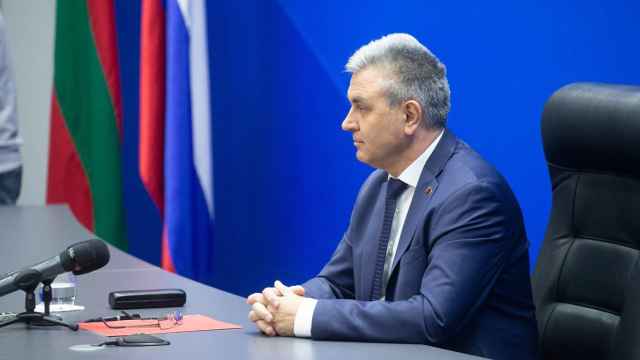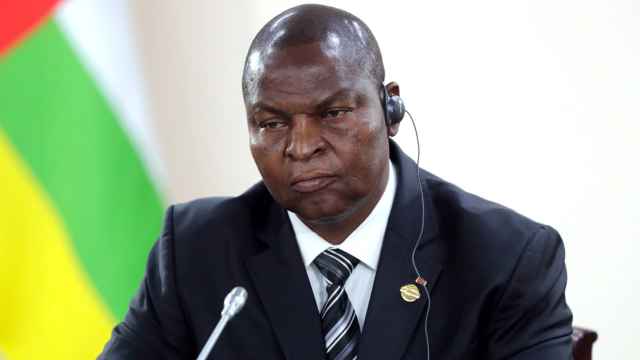“Let me speak from my heart in English,” sports minister Vitaly Mutko begged with an astonishingly thick accent at the December ceremony where Russia won the right to host the 2018 World Cup.
The speech — which Mutko confessed took him two weeks to memorize — prompted enough snickers to turn a video of his remarks into a YouTube hit with more than 1 million views.
But thousands of bureaucrats may soon follow him on the thorny road to multilingualism, if not YouTube fame.
The government wants at least 20 percent of federal officials to be fluent in a foreign language by 2020, and is even prepared to send them abroad to study in order to put Russia on a path toward an innovative future.
The policy is outlined in a report unveiled by the Economic Development Ministry on Dec. 31 and scheduled to be submitted to the government by late February, ministry spokesman Pavel Katkov said Wednesday.
The 124-page report gives little detail and does not elaborate on the cost of the project. Katkov also declined to provide details, saying his superiors planned to speak on the issue later this week.
In any case, the task is monumental. While no official data on how many civil servants speak foreign languages is available, politicians and observers alike agreed that the figure is small.
There were almost 880,000 federal officials as of 2009, although their ranks will be pared down by 20 percent by April 2013 under a government downsizing plan approved by President Dmitry Medvedev this month. But even the reduced figure implies that some 140,000 officials will be required to master a foreign language over the current decade.
The ministry's plan specifies that fluent English will become a requirement for newly hired civil servants starting in 2012.
Plenty of senior officials, including Prime Minister Vladimir Putin, his deputy Igor Sechin and Foreign Minister Sergei Lavrov, have used apparently fluent English before the cameras during meetings with foreign colleagues. Putin also speaks German after living in Dresden as a KGB spy in the 1980s.
Medvedev, a fairly fluent English speaker, took the spotlight during a trip to Silicon Valley last summer when he promised then-California Governor Arnold Schwarzenegger: "I'll be back.”
Zhanna Lypunova, a spokeswoman for Tver Governor Dmitry Zelenin, himself an English-language teacher by education, said local officials who dealt with “business and investment topics” were able to speak fluent English.
But some federal ministers, like Mutko and Finance Minister Alexei Kudrin, who has been the lone speaker on panel discussions at international conferences like the World Economic Forum to not speak in English, find it a struggle to communicate in a language other than Russian.
The foreign-language skills of bottom-tier officials are believed to be equally unimpressive, even though many of them have higher education diplomas, which imply completing language courses.
“Among the department heads and deputies the level is high, but it is difficult to say anything about lower subordinates,” said a government employee who spoke on condition of anonymity because he was not authorized to comment on the issue. He said he spoke fluent English and Spanish, while he spoke with a reporter in Russian.
Dozens of federal officials enroll for language classes every semester at the presidential Academy of Civil Service, said Alexander Dolgenko, head of the academy's linguistic department, which provides training for many career bureaucrats.
Dolgenko said tough measures might be needed to boost the number of foreign-language speakers because many officials do not have the time — or the drive — to sit through the 20-hour language courses his academy provides.
“We have used a carrot for a long time, but the bureaucrat has such a mindset that he needs a stick, too,” Dolgenko said. “If studying English were made part of his official job description, then we could achieve something.”
Another problem is that the communication skills of some bureaucrats are “too low,” even in Russian, Dolgenko said.
In Soviet times, the government handed out bonuses to bureaucrats, KGB staffers and scientists with the Academy of Sciences who could speak other languages. People who spoke German, French or English got 10 percent bonuses, while Asian languages like Japanese came with 15 percent bonuses.
Sergei Filatov, who headed the presidential administration under Boris Yeltsin in the 1990s, said that he and his subordinates “have suffered a lot” because of their inability to speak foreign languages.
“Despite the fact that we used professional interpreters from the Foreign Ministry, we had a feeling that some of our ideas were lost in translation,” he said.
The graying of officials may pose another problem to the government's language plans because nearly half of all top jobs are occupied by people over 50, an age where people generally have greater problems mastering a new language. The Economic Development Ministry addresses this problem by suggesting that only 30 percent of senior officials be over 50 by 2020.
Putin will be 67 in 2020, and Medvedev 54.
The ministry also suggests that state officials be sent abroad on paid leave for up to two years to attend postgraduate programs and language schools.
Only 0.1 percent of officials currently study abroad each year, and a meager 0.5 percent of senior bureaucrats have graduated from foreign schools and colleges, but the numbers will grow to 3 percent and 12 percent, respectively, by 2020, the ministry said, without elaborating on how much the proposal will cost.
Murad Sofizade, head of the Russian club of Harvard graduates and co-leader of a Kremlin-backed project called “Global Education for Russians,” which promotes education abroad, said the plans would have a positive effect for the government.
But he said it would be more productive to organize foreign-language courses taught by native speakers in Russia and only send those who successfully complete them abroad.
“Education abroad requires good foreign-language skills,” Sofizade said by telephone.
A Message from The Moscow Times:
Dear readers,
We are facing unprecedented challenges. Russia's Prosecutor General's Office has designated The Moscow Times as an "undesirable" organization, criminalizing our work and putting our staff at risk of prosecution. This follows our earlier unjust labeling as a "foreign agent."
These actions are direct attempts to silence independent journalism in Russia. The authorities claim our work "discredits the decisions of the Russian leadership." We see things differently: we strive to provide accurate, unbiased reporting on Russia.
We, the journalists of The Moscow Times, refuse to be silenced. But to continue our work, we need your help.
Your support, no matter how small, makes a world of difference. If you can, please support us monthly starting from just $2. It's quick to set up, and every contribution makes a significant impact.
By supporting The Moscow Times, you're defending open, independent journalism in the face of repression. Thank you for standing with us.
Remind me later.






